THIS year’s annual conference of the Railway Industry Association, which represents members of the British supply chain, took as its theme “promoting the case for rail and investment in uncertain times.” And there is certainly plenty of uncertainty facing the supply sector as it attempts to work out the longer-term implications of the government’s announcement on October 4 that it was scrapping Phase 2 of High Speed 2 (HS2), promising to spend the £36bn it was expected to cost on a wide range of other transport projects known as Network North.
“The requirement now is that we actually try to take what was announced and turn that into a proper strategy in which we understand what needs to be built, where it needs to be built, how it needs to be built, when it's going to be built and what it's going to cost,” said Sir John Armitt, chairman of the National Infrastructure Commission (NIC), in his keynote speech. “We have a bucketful of projects, which have been announced without any sort of real understanding of how that might fit into a plan,” he noted. “But fundamentally, you do have to spend more time on the why.”
Armitt described the government’s decision to scrap Phase 2 that would have extended the high-speed line from Birmingham to Manchester as “very disappointing,” but even more disappointing and difficult to understand was, in his view, its policy of disposing of any land acquired for the project as quickly as possible. “There needs to be a proper understanding of how we are going to effectively join Birmingham to Manchester for the long term,” he said, providing more capacity, preventing the M6 motorway between these cities from becoming totally congested and ensuring that the existing West Coast Main Line (WCML) is able to operate efficiently in future. The HS2 project was intended to relieve the pressure on this busy main line, providing more capacity for commuter services and freight trains.
“Fundamentally, you have to have a vision, you have to know where you're trying to go. And you have to get people to buy in to that vision.”
Sir John Armitt, chairman of Britain’s National Infrastructure Commission
“Let's think very carefully about what we're trying to do here and how we can reconfigure this into a way which is going to make building the first part of HS2 worthwhile,” Armitt said. “Because if all we're going to do is to build from London to Birmingham, and then get a donkey and cart to go the rest of the way, that is frankly not a very good solution.”
Asked if he still believed that the rail sector has a tendency to goldplate projects and push up their cost by over-specification, Armitt’s reply was an emphatic “yes.” “There are an enormous number of demands, from all sorts of people, including communities along the route,” he said, noting the high proportion of HS2 Phase 1 between London and Birmingham that is being built in tunnel to appease concerns overs its environmental impact. “There has to be a certain irrationality at the end of the day in project governance, which says ‘sorry, that's how much money I've got, I'm not going to spend any more money, will you go away and think again,’” Armitt said.
“We have to push back, we can't just spend and spend and spend. Because at the end of the day, we are not doing this for ourselves. We're doing it for the public.”
“People aren't going to decide whether to travel to Manchester or not on HS2 because they’re going to get there 10 minutes quicker,” he said. “They'll go because it's affordable, it's reliable and it's quick.” In addition, “the way we used to value time savings is different for all the people who are getting on the train now,” he said, noting how many passengers were travelling for leisure off-peak.
“The world has changed as a consequence of Covid,” Armitt said. “We are almost certainly not going back to five-day weeks. Commuters will now buy a daily ticket, not monthly or yearly. All these things we have to take onboard. We have to design our railway to meet those expectations. We have to be on our guard all the time.”
For Armitt, the decision to cancel Phase 2 was clearly a political judgement. “We live in a democracy and I'm afraid in a democracy, you're not going to get consistency in policy for 25 years,” he said. “At the end of the day, the politician doesn't listen to us. He listens to the voter.” For this reason, “it is so important that we try and build as much consensus as we can, across the different political perspectives.”
Wrong decision
But he was clear that the decision to scrap Phase 2 was wrong. “We cannot continue to hold the railway together with steel, tape and string, you can't continue to have a railway which was built 150, nearly 200 years ago. You’ve got to invest for the future.”
However, he said the case for continuing with HS2 in full had been harmed by poor project governance. “The way that it's been handled between project, ministers and the public has not been as good as it should be,” he said, noting in particular the lack of transparency over the cost of the project.
“Governance comes right at the beginning, understanding who's responsible for what,” he said. “Fundamentally, you have to have a vision, you have to know where you're trying to go. And you have to get people to buy in to that vision,” he said. “There's no magic wand. So you've got to be realistic. But start by saying what you are trying to do, what’s the vision, what do we want to do. What's the future going to look like. How can we make it better, because we’re only going to make it better together.”

